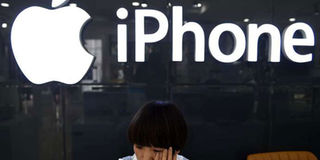Apple fights FBI bid to unlock iPhone

Apple, the iPhone maker, is challenging the California court order that directed it to allow investigators get into one of the shooter’s encrypted iPhone. PHOTO | AFP
What you need to know:
- Fourteen people were killed and 22 were seriously injured in December last year in a terrorist attack at the Inland Regional Center in San Bernardino, California, during a mass shooting.
- But critics say Apple is simply providing an easy way for criminals and others to operate in the shadows.
Technology firm Apple and the US Government are squaring off in an epic legal battle whose result could have wide-ranging implications on how technology firms work with law enforcement agencies.
The iPhone maker is being asked to provide “reasonable assistance” to investigators of last year’s deadly San Bernardino attacks by disabling security preventing the FBI from accessing the encrypted handset of one of the shooters.
The highly charged case has created a sharp divide between those who say that users of devices such as smartphones should be able to keep information private through encryption and those who claim that legitimate law enforcement investigations should take precedence.
Apple is challenging the California court order that directed it to allow investigators get into one of the shooter’s encrypted iPhone, saying the type of cooperation sought would undermine basic principles of data security and open new vulnerabilities for all its users.
The government is asking for the creation of software that doesn’t exist, an abuse of the law and violation of the company’s constitutional rights, says Apple, adding that creating a weaker “government operating system” would undermine the encryption Apple and others have been introducing and ultimately leak out to hackers and foreign governments.
Fourteen people were killed and 22 were seriously injured in December last year in a terrorist attack at the Inland Regional Center in San Bernardino, California, during a mass shooting.
The perpetrators, Syed Rizwan Farook and Tashfeen Malik, a married couple, targeted a San Bernardino County Department of Public Health training event and holiday party, of about 80 employees, in a rented banquet room.
The couple were American citizen of Pakistani descent.
PRIVACY
After the shooting, the couple escaped in a rented vehicle and police pursued them and shot them dead in a shootout.
“Apple wants to maintain the trust relationship with its customers, they feel deeply and firmly this is something that has to exist and that no government should have access to this data,” said John Dickson of the Texas-based Denim Group, which manages security and encryption for its customers.
“I anticipate there will be a technical response from Apple so that it will be nearly impossible for them to be compelled to do anything,” he added.
Julian Sanchez of the libertarian Cato Institute says in a blog post the case is “a fight over the future of high-tech surveillance, the trust infrastructure undergirding the global software ecosystem and how far technology companies and software developers can be conscripted as unwilling suppliers of hacking tools for governments.”
Some say Apple’s position is based on a core principle about security of its users’ data.
“Lack of privacy can be a matter of life and death or imprisonment,” said Jon Hanour, chief executive of California startup USMobile, which makes an application for encrypted mobile messaging.
But critics say Apple is simply providing an easy way for criminals and others to operate in the shadows.
Allowing Apple to refuse would “thwart the public interest in a full and complete investigation of a horrific act of terrorism,” the Justice Department argued in its court motion.
REASONABLE REQUEST
New York County District Attorney Cy Vance, who has complained that encrypted phones have frustrated many investigations, said Apple and other makers of encryption should not be allowed to help skirt law enforcement.
“Apple and Google have created the first warrant-proof consumer products in American history and the result is that crimes are going unsolved and victims are being left beyond the protection of the law,” he said in a statement.
Apple argues that being forced to comply would set a dangerous precedent allowing broad access to law enforcement.
“Once the floodgates open, they cannot be closed and the security that Apple has worked so tirelessly to achieve will be unwound,” Apple says.
But James Lewis, a former US official who is now a senior fellow at the Center for Strategic and International Studies, said there is nothing unusual about the case.
“The court decided this was a reasonable request,” Lewis told AFP. “The privacy people say it will set a precedent and it will be the end of life on this planet and it’s not true.”
Additional reporting by AFP





